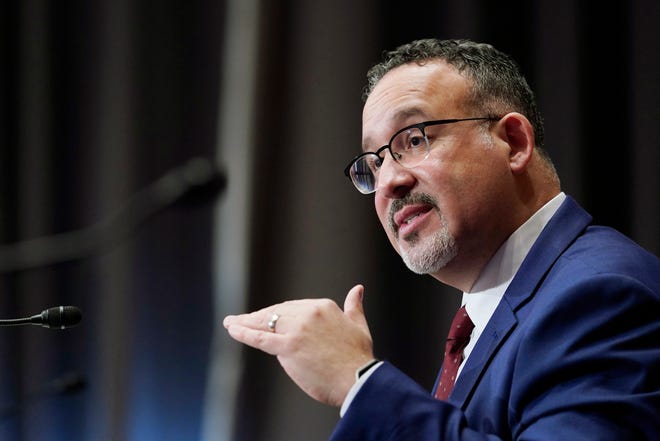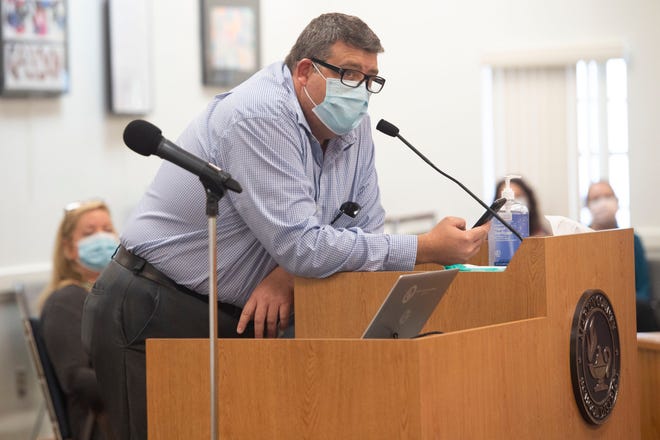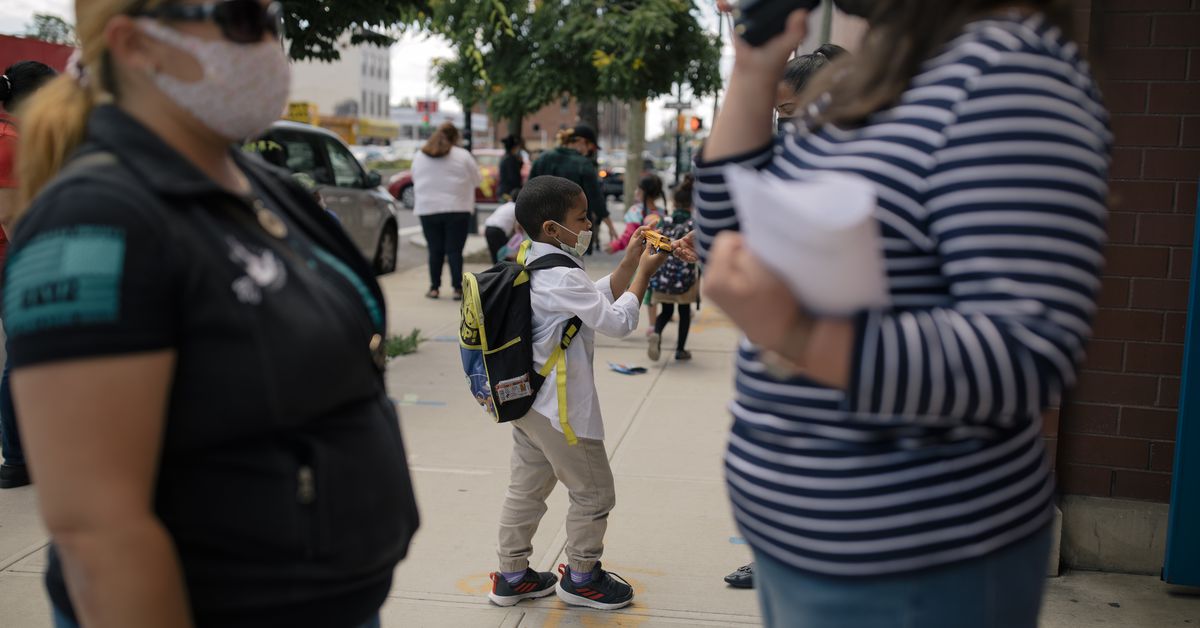Education secretary nominee Miguel Cardona on COVID, school reopening
A Senate committee advanced the nomination of Miguel Cardona as the next U.S. education secretary Thursday, putting him a step closer to guiding the reopening of more schools, albeit under a scaled-back plan announced by the White House this week.
Cardona, the commissioner of education in Connecticut, won praise from Republicans and Democrats on the Senate Committee on Health, Education, Labor and Pensions. Members voted 17-5 to approve him, and the full Senate will probably do the same soon.
Cardona would succeed Betsy DeVos and take the helm of American schooling at a fraught time. Debates about reopening K-12 classrooms have pitted teachers, administrators, school boards and parents against each other. Colleges are bleeding money. Student debt is mounting. Learners are struggling to keep up with classes online.
Congress is debating another enormous coronavirus relief package that, if passed as proposed by President Joe Biden, would send $130 billion to schools.
As a first-generation college student, a former teacher and administrator, a father of school-age children and someone who grew up poor and speaks English as a second language, Cardona has personal experience with just about all the key issues in K-12 and higher education.
Although the federal government’s role in local education matters is limited, Cardona would have broad oversight powers and can set the tone for what’s important. Here’s what he’d probably focus on first.
Schools can reopen safely, Cardona says
Biden scaled back his election pledge to reopen the majority of K-12 schools within his first 100 days. Biden’s team first narrowed that to K-8 schools. Tuesday, the administration said the new goal is to open more than half of K-8 schools for at least one day a week of classroom instruction.
‘At least one day a week’:White House clarifies Biden’s goal to reopen schools
By some measures, that’s already happening – which may pose a hurdle for Education Department messaging. About 64% of U.S. students attend schools offering at least some in-person learning, according to Burbio, a company that aggregates school calendars. About 35% attend schools with virtual-only plans, the company said.
Forty-three of 75 large districts that belong to the Council of Great City Schools, a member organization, offer some in-person learning, according to a tally kept by Education Week magazine and the council. The extent of classroom instruction varies widely.
Teachers unions in cities including Chicago, Philadelphia, San Francisco, Buffalo, New York, and Montclair, New Jersey, have pushed back against opening classrooms because they don’t trust their districts could do it safely. Chicago’s teachers headed back to classrooms Thursday after union and city leaders clashed for weeks over the plan to bring more K-8 educators and students back to buildings.
Union pushback:These parents want their kids back in school. Teachers are wary.
Schools can reopen safely without all teachers being vaccinated against COVID-19, Cardona said at his confirmation hearing Feb. 3, a sentiment echoed by the Centers for Disease Control and Prevention. The CDC is likely to release more guidance on school reopening Friday.
Cardona said schools need more resources to reopen and to provide extended learning opportunities. Teachers should be able to get vaccinated swiftly – at public and private schools, he said.
“There is no substitute for a classroom experience for our students,” Cardona said, adding that he’d bring a “mentality of partnership and clear communication to help recover our public education and reopen our schools.”
In-person school can be safe:CDC reports how schools with little COVID-19 spread are making it work
Standardized tests this spring?
Will students have to take state standardized achievement tests this spring? And if so, will the results be used to judge the performance of students and teachers?
Federal law requires states to give annual standardized achievement exams in reading and math to students in grades 3-8 and once to those in high school, and to report the results. Many schools issue their own quick tests for progress over the year, but those are locally decided and not federally mandated.
Amid school closures last spring, DeVos and her team waived the federal testing requirement in 2020.
Cardona didn’t say whether that would happen again this year. It’s important to test students for a guidepost on how far they’ve progressed academically, he said at his hearing, but he acknowledged the pandemic and remote learning present major hurdles.
“If the conditions under COVID-19 prevent a student from being in school in person, I don’t think we need to be bringing students in just to test them,” Cardona said.
Before the pandemic, a school’s low scores on state exams could trigger anything from additional money for improvement efforts to additional scrutiny from the state or federal government – or both. Cardona hasn’t specified how the Department of Education should use the results of any exams administered this year, but he did say states should have a voice in that matter.

Increasing support for English learners, community colleges
Cardona stressed that he’s in favor of strategies to help disadvantaged children get ahead, such as increasing opportunities for students to take college classes in high school, expanding support for English learners and encouraging more pathways to college and technical careers.
Cardona has repeatedly praised the work of community colleges, calling them “the nation’s best-kept secret” in his hearing. This echoes sentiments from Biden, who said he would push for legislation making two-year programs tuition-free, and first lady Jill Biden, a community college instructor.
Student enrollment has sunk at these institutions during the pandemic, which is likely to affect their long-term financial health.
Cardona’s championing of community colleges has received some bipartisan support. Sen. Roger Marshall, R-Kan., said he and his wife were community college graduates, and he hoped students would consider attending these institutions as a way to save money.
Cardona said community colleges would be important for economic rebuilding.
“They serve the community, it’s in the name,” Cardona said. “What we need to do more is make those programs more available and accessible earlier for our learners.”
A focus on civil rights, LGBTQ students
“We’re going to make sure learning environments are places that will be free of harassment for LGBTQ students,” Cardona said at his hearing.
Cardona stressed the legal rights of transgender children when pressed by two Republican senators about transgender girls competing against biological girls in high school sports.
“The Supreme Court ruled discrimination based on gender is illegal,” he said.
Being LGBTQ during COVID-19:Why some LGBTQ people struggle with makeup-free and natural hair trends

The Department of Education sets guidance for how schools and districts should handle issues around civil rights and equity for children, but there’s long been debate about the proper scope of that guidance.
Under the Obama administration, the Office of Civil Rights collected data from schools about systemic issues, such as racial inequities in discipline. Under the Trump administration, DeVos and her team focused more on investigating individual civil rights complaints against schools.
Big-picture data-gathering would probably ramp up under a Cardona administration. The Education Department announced a national survey to track how school districts offer instruction this year, with enrollment and attendance rates by race, income, disability and English learner status.
All the plans that are missing
Cardona will need to provide plans on a number of other topics, such as how to handle sexual assault complaints on campuses, whether student loan debts should be forgiven and how far to go in guiding plans for helping students catch up academically.
Students from vulnerable backgrounds – those who are low-income or racial minorities or have special learning needs – were more likely to fall behind, not graduate and not pursue a post-secondary education compared with their wealthier peers, even in pre-pandemic times.
“We will boldly address educational inequities head on,” Cardona said at his hearing.
But the specifics are yet to come.







